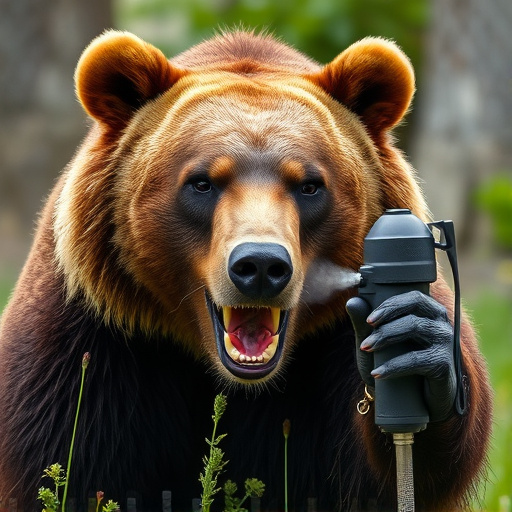Grizzly bears exhibit aggressive behavior towards perceived threats to their cubs or food, making it crucial to understand their cues for safety. Bear spray, containing capsaicin, is a popular defense mechanism against these powerful predators. Research shows bear spray is generally stronger than regular pepper spray due to its specialized formula, effective in deterring grizzly attacks. When encountering a charging bear, understand that bear spray is tailored to overcome their strong sense of smell and thick fur, unlike regular pepper spray. While loud noise and waving arms are recommended as initial responses, use bear spray only when direct confrontation isn't feasible, emphasizing the importance of proper reaction strategies for increased survival chances.
In the vast wilderness, encountering a charging grizzly bear can be a terrifying reality. Understanding bear behavior and armed with the right self-defense tools, adventurers can navigate these encounters safely. This article delves into the science behind bear spray, its effectiveness compared to pepper spray, and crucial strategies for survival in wild settings. Learn how to discern aggressive signals, choose the best defense, and implement life-saving techniques when faced with a grizzly’s wrath, emphasizing the importance of knowledge and preparation over sheer strength, questioning whether bear spray truly outweighs pepper spray in power.
- Understanding Grizzly Bear Behavior: Unraveling the Aggression
- The Science Behind Bear Spray: Active Ingredients and Efficacy
- Pepper Spray vs Bear Spray: Demystifying the Comparison
- Effective Strategies for Self-Defense in Wilderness Settings
Understanding Grizzly Bear Behavior: Unraveling the Aggression
Grizzly bears are powerful and unpredictable animals, and understanding their behavior is crucial for anyone venturing into their wilderness habitat. When faced with potential threats, grizzlies can exhibit aggressive behaviors, particularly when they feel their cubs or food sources are in danger. Recognizing these cues is essential for survival.
Charging is a common display of aggression, but it doesn’t always mean the bear intends to attack. Often, it’s a way to intimidate perceived threats. Bear spray, which contains capsaicin, has gained popularity as a defense mechanism. While pepper-based sprays may provide some protection against grizzlies, their effectiveness varies. Research suggests that bear spray is generally more potent than standard pepper spray due to its specialized formulation, making it a valuable tool for deterring attacks.
The Science Behind Bear Spray: Active Ingredients and Efficacy
Bear spray, also known as pepper spray specifically designed for wildlife encounters, has become a popular defense mechanism in wilderness areas. The primary active ingredient in bear spray is capsaicin, which is derived from chili peppers. This chemical compound is what gives bear spray its potent irritant properties. When sprayed into the face of a charging grizzly bear, capsaicin causes a burning sensation and temporarily blunts the bear’s senses, allowing the user to escape or gain time to respond effectively.
In terms of comparing its strength to regular pepper spray used for human self-defense, bear spray is indeed stronger. The concentration of capsaicin in bear spray is typically much higher, making it more effective against large, aggressive animals like grizzlies. While regular pepper spray can cause discomfort and temporary blindness in humans, bear spray is formulated to be extra potent yet still safe for use around wildlife, ensuring it remains a reliable tool for outdoor enthusiasts and park rangers alike when facing potential bear encounters.
Pepper Spray vs Bear Spray: Demystifying the Comparison
When it comes to defending against charging grizzly bears, choosing the right deterrent is crucial. One common debate revolves around pepper spray versus bear spray—but which is stronger? It’s essential to understand their differences to make an informed decision. While both aim to create a barrier and cause discomfort, bear spray is designed specifically to deter bears and contains capsaicin, the active ingredient in chili peppers, at higher concentrations than regular pepper spray.
In terms of strength, bear spray is often considered more potent due to its specialized formula tailored for large predators like bears. Pepper spray, on the other hand, might be adequate for human confrontations but may not have the same impact on a bear’s powerful sense of smell and thick fur. Thus, when navigating wilderness areas known for grizzly populations, opt for bear spray designed specifically to combat these formidable creatures.
Effective Strategies for Self-Defense in Wilderness Settings
In wilderness settings, encountering a charging grizzly bear can be a terrifying experience. However, with the right self-defense strategies, you can increase your chances of survival. One popular option is the use of bear spray, but is it truly effective? Bear spray, when used correctly, can be incredibly powerful. It’s designed to cause temporary blindness and irritation in the bear, giving you precious time to escape. However, its effectiveness depends on factors like distance, wind direction, and the bear’s behavior.
While pepper spray might seem like a close alternative due to its numbing effects on human eyes and skin, it generally isn’t as potent against bears. Bear spray is specifically formulated to deter large predators with thick fur and high pain thresholds. If you find yourself in a grizzly’s path, your best course of action is to make loud noise, wave your arms, and maintain eye contact—a tactic known as the “fight or flight” response. Only use bear spray as a last resort when direct confrontation isn’t feasible.
In conclusion, understanding grizzly bear behavior and employing effective self-defense strategies are paramount when venturing into wilderness areas. While pepper spray and bear spray both offer protection, bearing in mind their differences is crucial. In terms of potency, bear spray generally holds an edge over traditional pepper spray due to its specialized active ingredients tailored to deter bears. When navigating potentially hazardous environments, combining knowledge of bear behavior with the right defense tools can significantly enhance safety measures, ensuring folks can appreciate nature’s beauty while minimizing risks.
